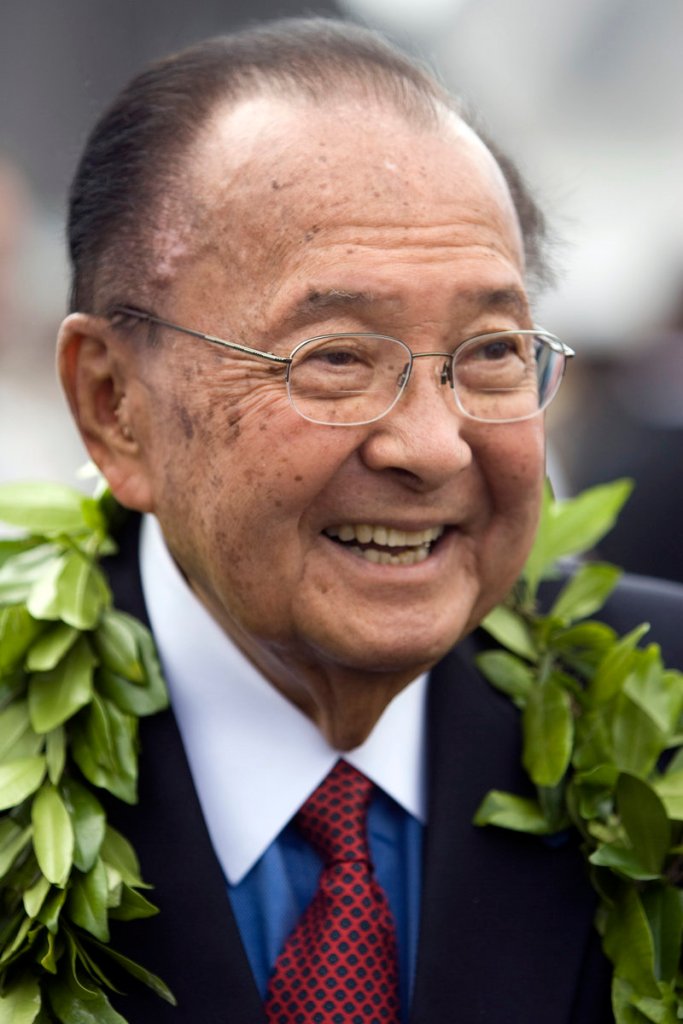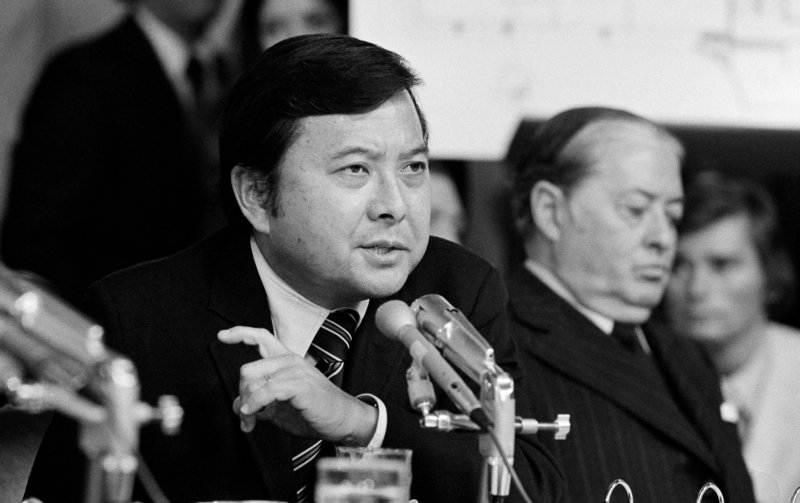WASHINGTON — Recovering from war wounds that left him with one arm, Danny Inouye wanted a cigarette and needed a light.
The nurse at the Army hospital in Michigan threw a pack of matches on his chest. He wanted to curse her. Instead, she taught him how to light it one-handed.
“Then she said, ‘I’m not going to be around here for the rest of your life. You’ll have to learn how to light your own matches, cut your own meat, dress yourself and do everything else. So from now on you’re going to be learning,’ ” Inouye recalled decades later.
From that moment on it seemed like nothing would stop a determined Daniel K. Inouye, who died Monday after a uniquely American life defined by heroism in war and decades of service in the Senate — and a lifelong love of Hawaii symbolized by his last utterance: “Aloha.”
Inouye, who broke racial barriers on Capitol Hill and played key roles in congressional investigations of the Watergate and Iran-Contra scandals, was 88.
A senator since January 1963, Inouye was currently the longest-serving senator and was president pro tempore of the Senate, third in the line of presidential succession. His office said Monday that he died of respiratory complications at a Washington-area hospital.
Less than an hour after Inouye’s passing, Senate Majority Leader Harry Reid announced Inouye’s death to a stunned chamber. “Our friend Daniel Inouye has died,” Reid said somberly. Shocked members of the Senate stood in the aisles or slumped in their chairs.
Inouye was a World War II hero and Medal of Honor recipient who lost an arm to a German hand grenade during a battle in Italy. He became the first Japanese-American to serve in Congress, when he was elected to the House in 1959, the year Hawaii became a state. He won election to the Senate three years later and served there longer than anyone in American history except Robert Byrd of West Virginia, who died in 2010 after 51 years in the Senate.
President Obama, a native of Hawaii, said in a statement, “Tonight, our country has lost a true American hero with the passing of Sen. Daniel Inouye. … It was his incredible bravery during World War II — including one heroic effort that cost him his arm but earned him the Medal of Honor — that made Danny not just a colleague and a mentor, but someone revered by all of us lucky enough to know him.”
Obama also sent a tweet that ended “Aloha, Danny.”
Inouye died after a relatively brief hospitalization. Once a regular smoker, he had a portion of a lung removed in the 1960s after a misdiagnosis for cancer. Just last week, he issued a statement expressing optimism about his recovery.
Despite his age and illness, Inouye’s death shocked members of the Senate.
“I’m too broken up,” said Sen. Patrick Leahy, D-Vt., who becomes president pro tem of the Senate. Leahy also is poised to take over the Senate Appropriations Committee.
“He was the kind of man, in short, that America has always been grateful to have, especially in her darkest hours, men who lead by example and who expect nothing in return,” said Senate Minority Leader Mitch McConnell, R-Ky.
Hawaii Gov. Neil Abercrombie will appoint a replacement, choosing from a list of three candidates selected by the state Democratic Party. “We’re preparing to say goodbye,” Abercrombie said. “Everything else will take place in good time.”
Whomever Abercrombie appoints would serve until a special election in 2014.
Inouye has represented Hawaii since it became a state in 1959, first in the House. He was handily re-elected to a ninth term in 2010 with 75 percent of the vote.
Inouye became president pro tem of the Senate in 2010, a largely ceremonial post that also placed him in the line of succession to the presidency, after the vice president and the speaker of the House.
Earlier, he had taken the helm of the powerful Appropriations Committee, where he spent most of his Senate career attending to Hawaii. At the height of his power, Inouye routinely secured tens of millions of dollars annually for the state’s roads, schools, national lands and military bases.
Although tremendously popular in his home state, Inouye actively avoided the national spotlight until he was thrust into it. He was the keynote speaker at the 1968 Democratic National Convention, and later reluctantly joined the Senate’s select committee on the Watergate scandal. The panel’s investigation led to the resignation of President Richard Nixon.
Inouye also served as chairman of the committee that investigated the Iran-Contra arms and money affair, which rocked Ronald Reagan’s presidency.
A quiet but powerful lawmaker, Inouye ran for Senate majority leader several times without success. He gained power as a member of the Senate Appropriations Committee and chairman of the defense appropriations subcommittee before Republicans took control of the Senate in 1994.
When the Democrats regained control in the 2006 elections, Inouye became chairman of the Senate Commerce Committee. He left that post two years later to become chairman of the powerful Senate Appropriations Committee.
Inouye also chaired the Senate Indian Affairs Committee for many years. He was made an honorary member of the Navajo nation and given the name “The Leader Who Has Returned With a Plan.”
In 2000, Inouye was one of 22 Asian-American World War II veterans who belatedly received the nation’s top honor for bravery on the battlefield, the Medal of Honor. The junior senator from Hawaii at the time, Daniel Akaka, had worked for years to get officials to review records to determine if some soldiers had been denied the honor because of racial bias.
Inouye’s first political campaign in 1954 helped break the Republican Party’s political domination of Hawaii. He was elected to the Territorial House of Representatives, where he served as majority leader. He became a territorial senator in 1958.
Inouye was serving as Hawaii’s first congressman in 1962, when he ran for the Senate and won 70 percent of the vote against Republican Benjamin Dillingham II, a member of a prominent Hawaii family.
He is the last remaining member of the Senate to have voted for the Civil Rights Act of 1964.
“He served as a defender of the people of this country, championing historic changes for civil rights, including the equal rights of women, Asian-Americans, African-Americans and Native Hawaiians,” said a visibly emotional Sen. Daniel Akaka, his longtime Hawaii colleague. “It is an incredible understatement to call him an institution, but this chamber will never be the same without him.”
In 1968, President Lyndon Johnson urged Vice President Hubert Humphrey, who had won the Democratic nomination for president, to select Inouye as his running mate. Johnson told Humphrey that Inouye’s World War II injuries would silence Humphrey’s critics on the Vietnam War.
“He answers Vietnam with that empty sleeve. He answers your problems with (Republican presidential candidate Richard) Nixon with that empty sleeve,” Johnson said.
But Inouye was not interested.
“He was content in his position as a U.S. senator representing Hawaii,” Jennifer Sabas, Inouye’s Hawaii chief of staff, said in 2008.
Send questions/comments to the editors.




Success. Please wait for the page to reload. If the page does not reload within 5 seconds, please refresh the page.
Enter your email and password to access comments.
Hi, to comment on stories you must . This profile is in addition to your subscription and website login.
Already have a commenting profile? .
Invalid username/password.
Please check your email to confirm and complete your registration.
Only subscribers are eligible to post comments. Please subscribe or login first for digital access. Here’s why.
Use the form below to reset your password. When you've submitted your account email, we will send an email with a reset code.